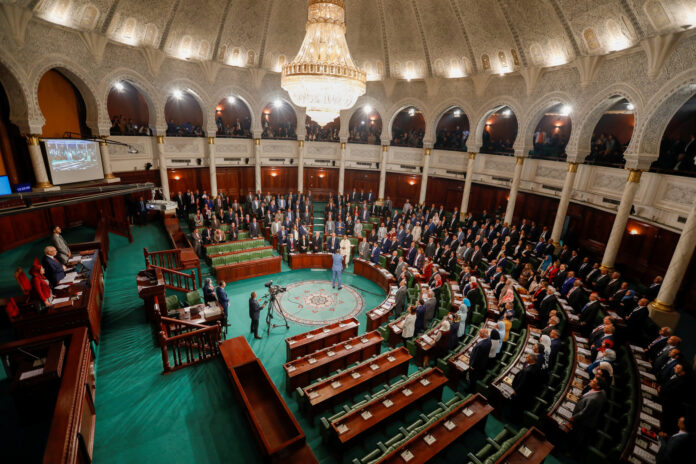The plenary session of the People’s Assembly will be held to discuss, on Wednesday, July 7, a draft law related to reviving the economy and settling exchange files, which includes measures to reduce the tax burden on institutions, push investment and other measures to integrate activities and currency derived from the parallel economy into the economic cycle, in addition to measures to combat tax evasion and support transparency.
The draft law also includes proposals to further rationalize the circulation of money in cash, as well as measures for the benefit of the Tunisian community abroad and some different measures.
Reducing the tax burden
The draft law contains proposals for the benefit of institutions and investors, mainly to enable companies to re-evaluate the built and non-built properties included in their budgets and to exempt the excess value from forfeiting from tax.
The state also supports all exporting institutions to restore the pace of their activity according to the current crisis, and to enable institutions that spend research and development expenses to offer an additional 50 percent.
It also includes proposals to reduce the tax burden on the first transfers of housing to real estate developers and subject these operations to registration with the fixed tax set at 25 dinars for each page of each copy instead of the tax set at 3 percent for homes whose value exceeds 300,000 dinars.
The committee suggested giving more flexibility to the administrative objection procedures by not claiming the debts subject of the objection in the form of the declaration after the legal deadlines, in addition to setting the ceiling for the sins owed on the heavy public debts, where the financial amounts employed under the title of these sins cannot exceed the origin of the debt.
The draft law also stipulates the settlement of customs violations and misdemeanours, by enabling economic institutions that have been convicted in customs cases or against which customs records have been filed, to limit themselves to paying in writing 10 percent of the sums of due fees and payments.
Parallel Economy
The draft law proposes the introduction of a liberalization tax of 10 percent on the amounts derived from unauthorized income and profits and be freed from all payments and taxes due in accordance with the fiscal legislation, provided that the mentioned amounts are deposited in a bank or postal account, which is considered a tax discharge for its owner.
A procedure was also established to settle violations related to holding currencies in the form of foreign banknotes in Tunisia and foreign currency gains without authorizing them in return for paying a tax of 10 percent and freeing the beneficiary of the amnesty from any tax or customs release with the deposit of these currencies in special accounts in currency or convertible dinars .
The draft law suggested rehabilitating the collection departments to assign a tax identifier directly to the persons who violate the duty to declare their presence, in order to enable the aforementioned departments to follow up on the tax situation of the persons concerned.
money circulation for cash
The state seeks to further urge people to adopt bank payment methods by reducing the amount specified in b, 5,000 dinars to 3,000 dinars paid in cash and stipulated in the tax legislation in force, with regard to not accepting a subtraction from the income tax base or corporate tax The burden of exploitation and depreciation of assets equal to or greater than 3,000 dinars instead of 5,000 dinars, for which they are paid in cash.
And it asked not to accept the subtraction of the performance on the value-added employee on goods, property and services whose amount is equal to or greater than 3.00 dinars instead of 5,000 dinars, for which they are paid in cash.
It also proposes to raise the tax paid to the state treasury from 1% to 5% for each amount paid in cash to the public accountant in excess of 3,000 dinars instead of 5,000 dinars, with the abolition of cash circulation for the acquisition of specialized products, by stipulating the use of bank, postal or electronic payment methods. .
different actions
The government suggested reviewing the fees employed when exporting iron waste and stainless steel, copper and aluminum waste, based on objective criteria, in the direction of compatibility with the current situation with the provisions of Chapter 65 of the Constitution.
It seeks to harmonize the rules related to the recovery of surplus performance with the requirements of preserving the rights of the state treasury to extract the tax resources employed for its benefit by returning the surplus performance that was approved by the collection interests within the notification of the results of the tax audit after subtracting 50 percent of the amounts due under the same notification of the results of the tax audit or by other notification.








